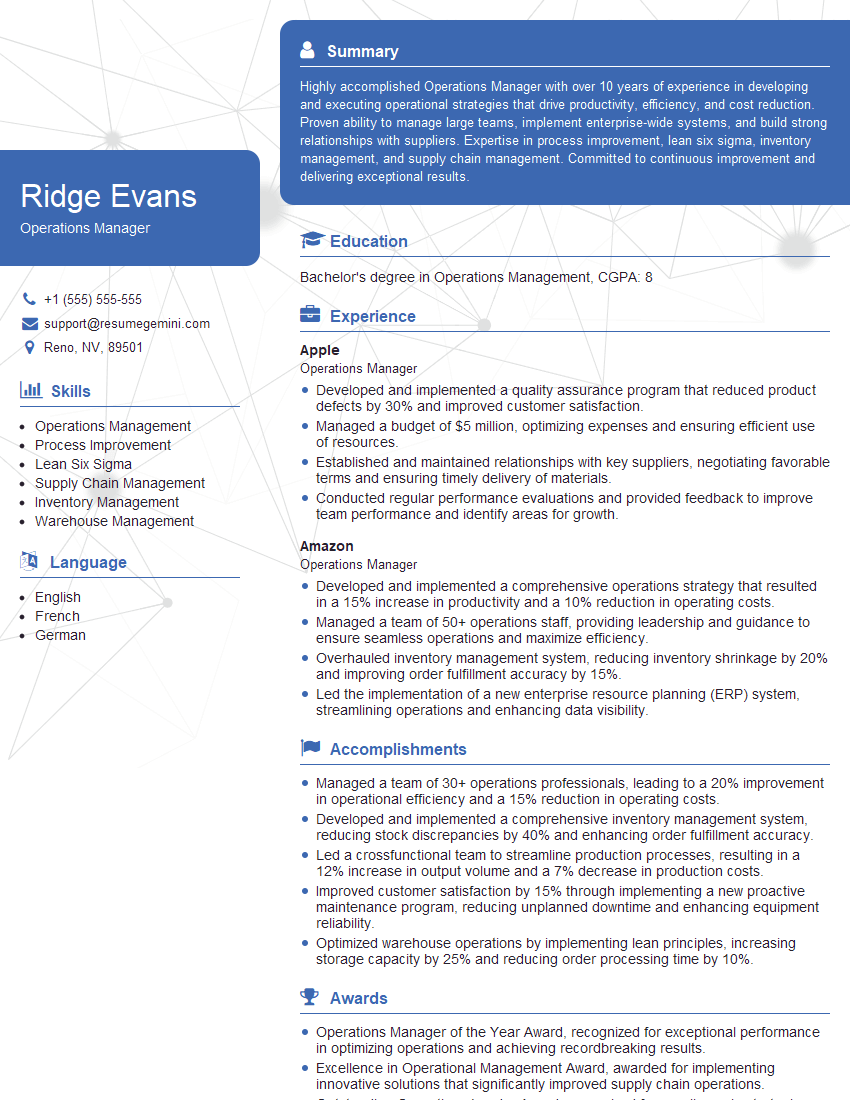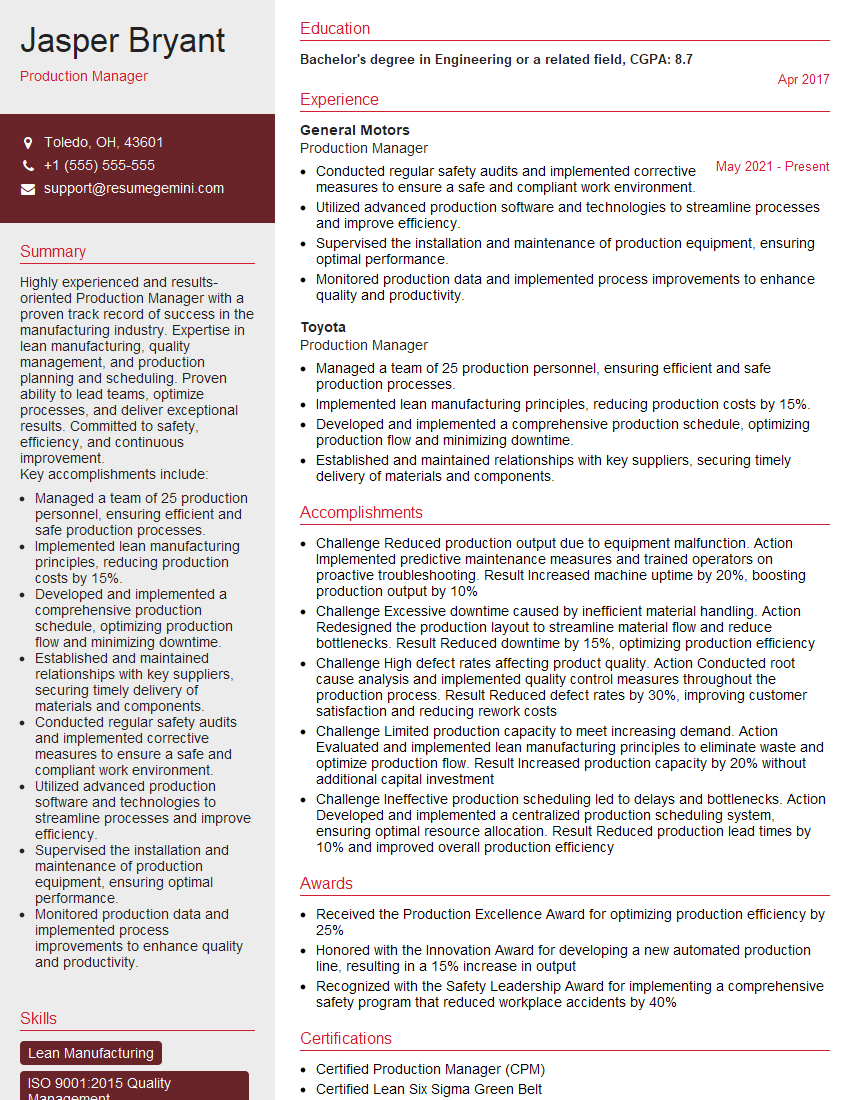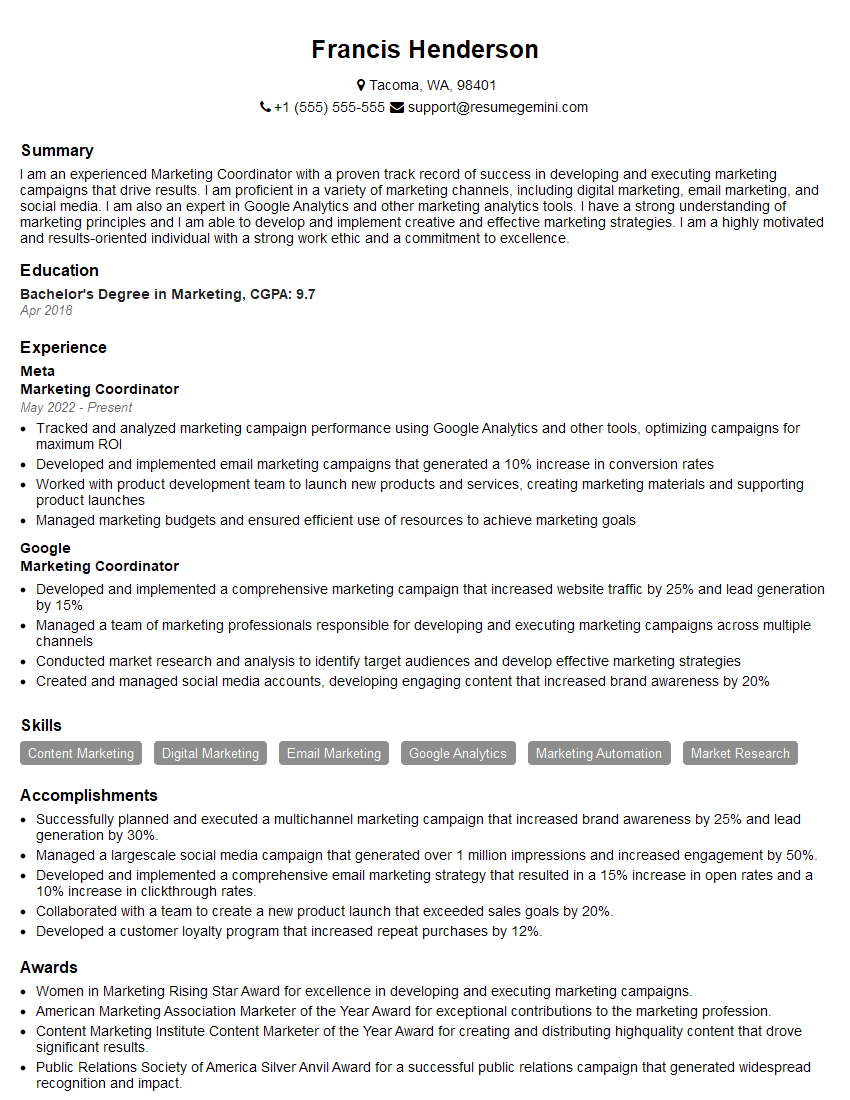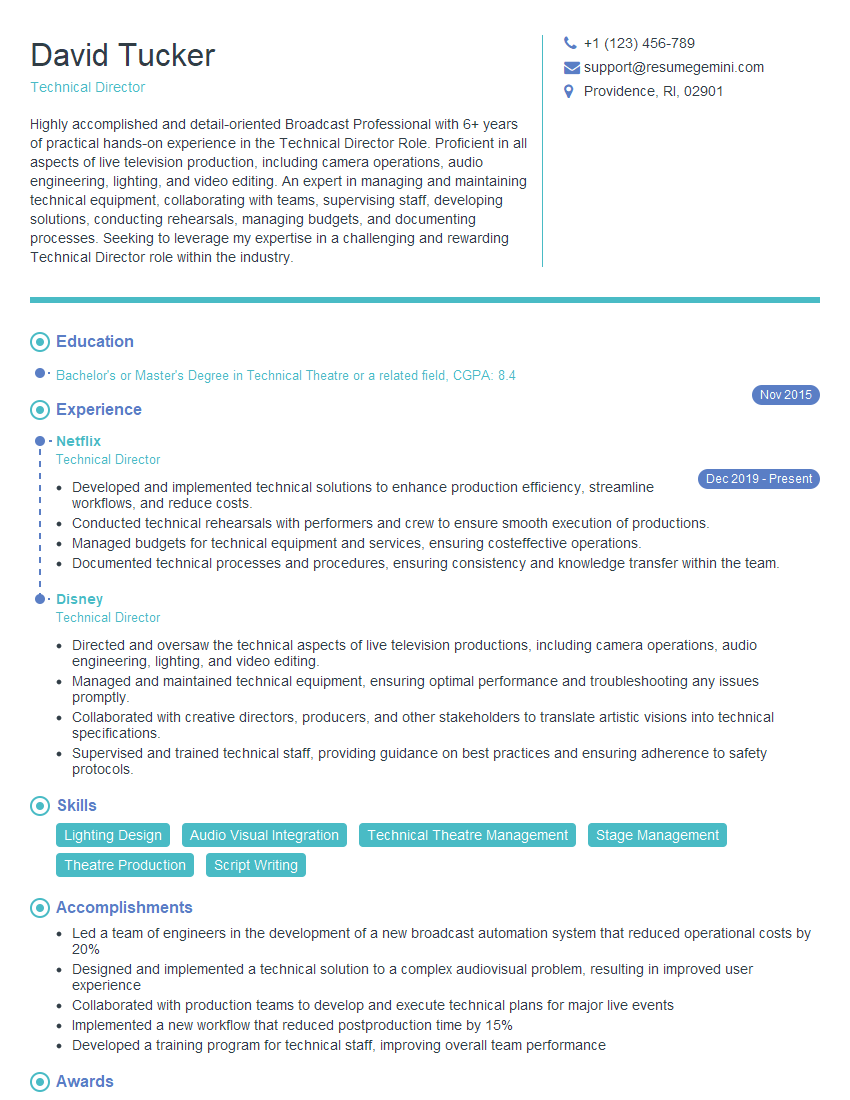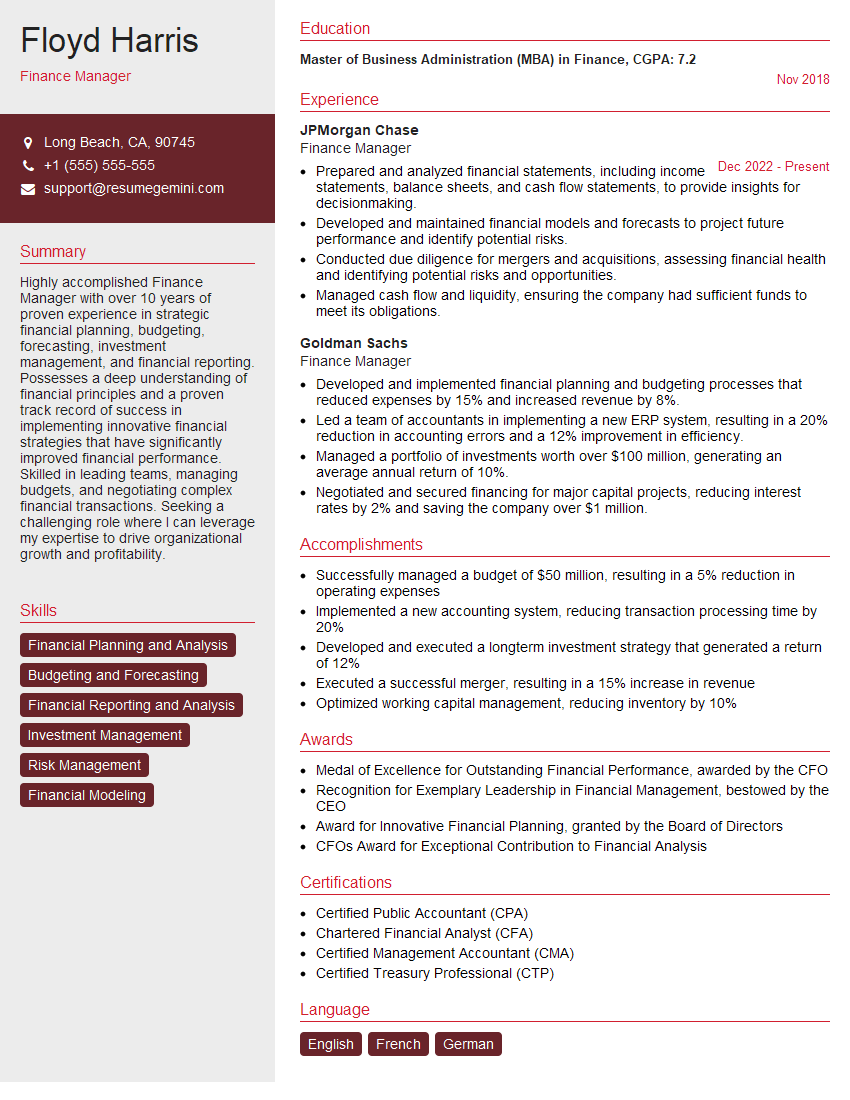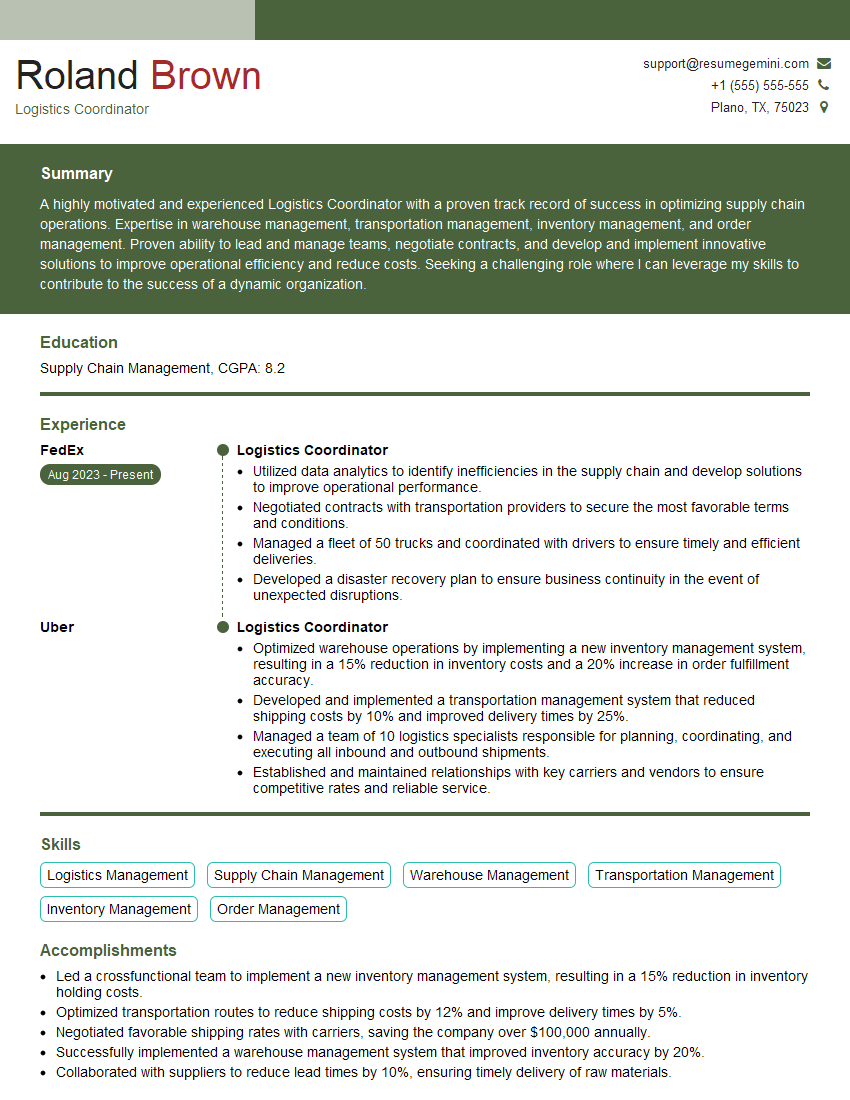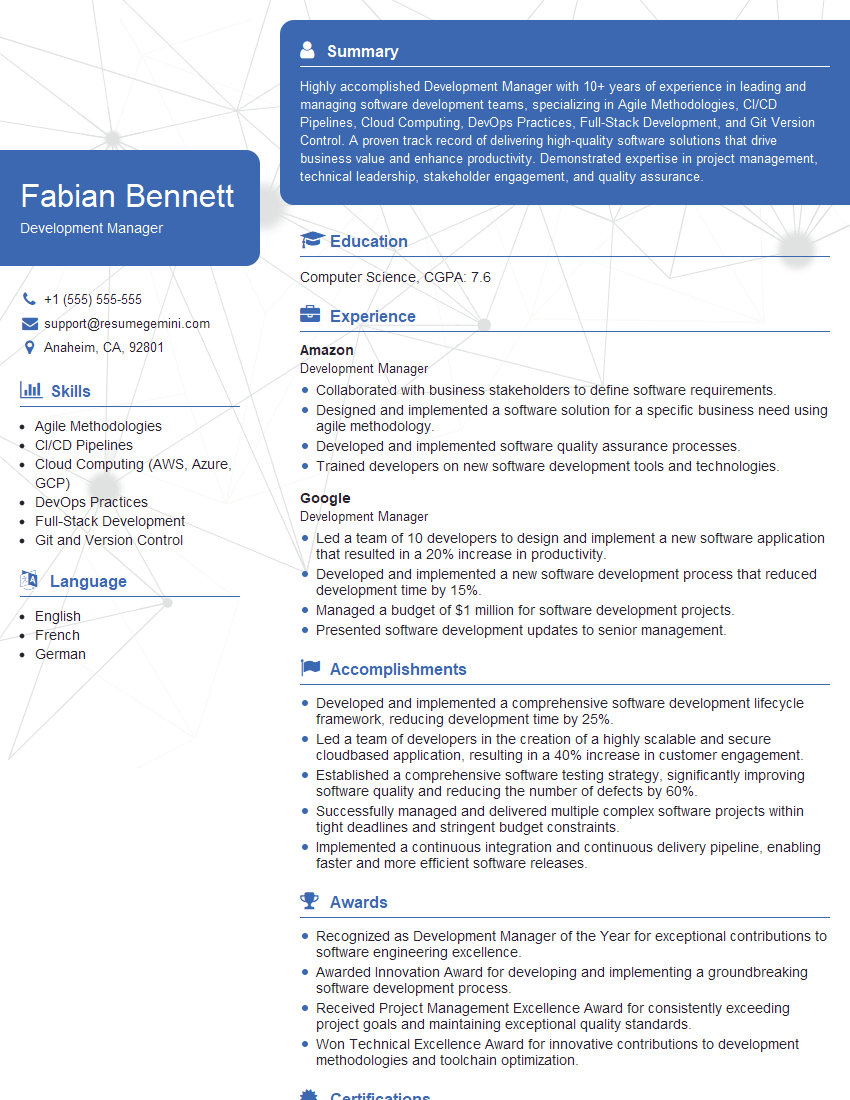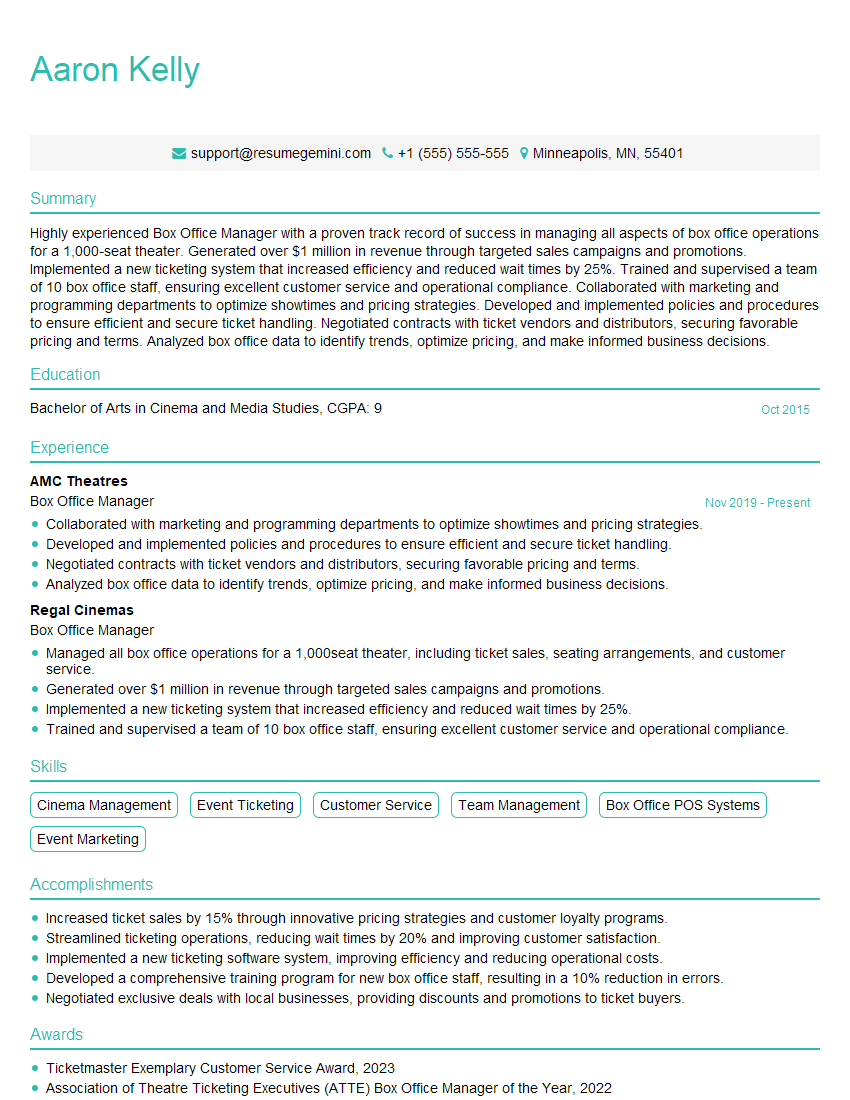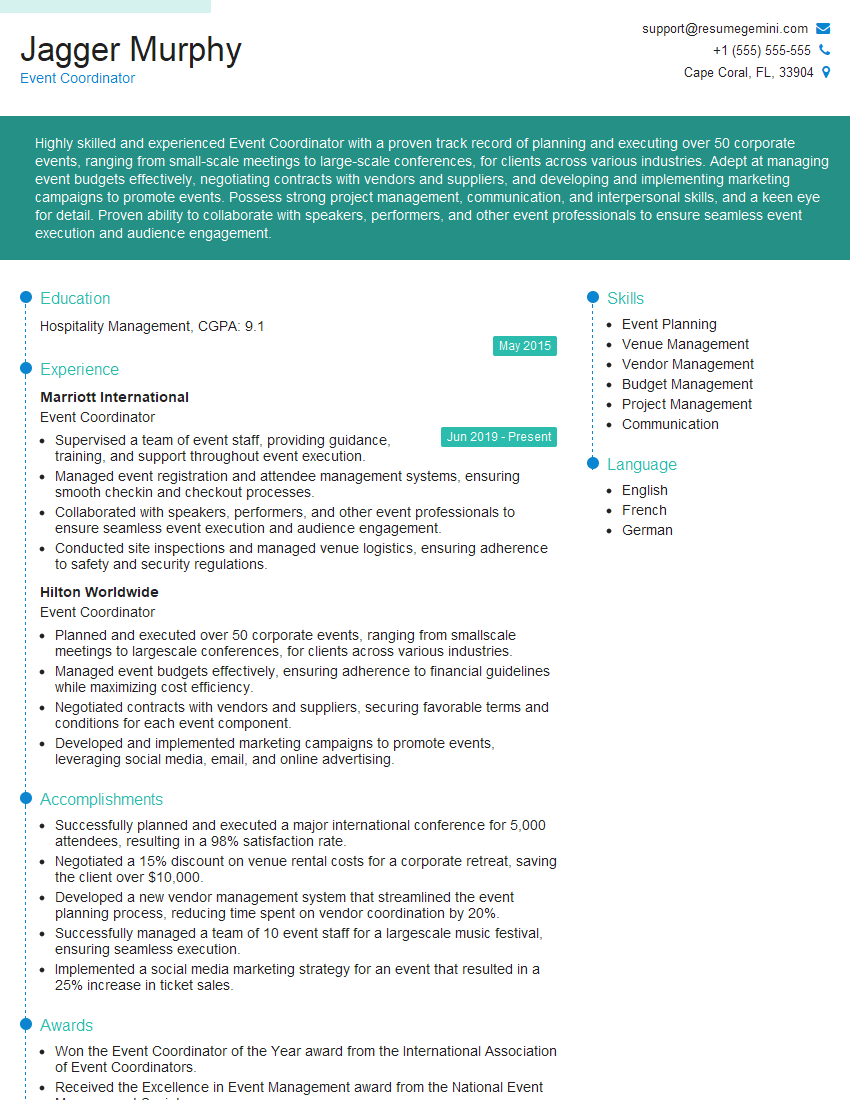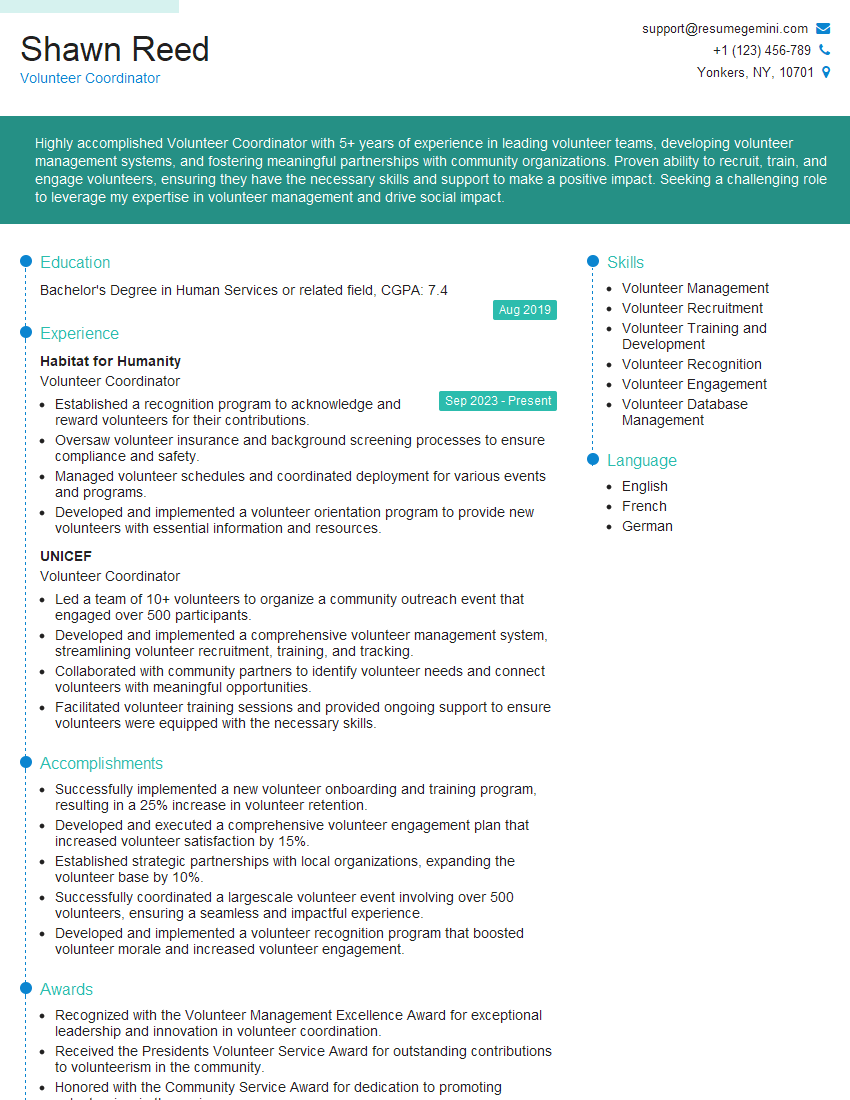Preparation is the key to success in any interview. In this post, we’ll explore crucial Film Festival Management interview questions and equip you with strategies to craft impactful answers. Whether you’re a beginner or a pro, these tips will elevate your preparation.
Questions Asked in Film Festival Management Interview
Q 1. Describe your experience managing budgets for film festivals.
Managing a film festival budget requires meticulous planning and execution. It’s like running a small business, where every dollar counts. My approach begins with a comprehensive budget template, forecasting all income and expenses. This includes categories such as film acquisition fees, venue rental, marketing and advertising, staff salaries, catering, and printing.
I utilize spreadsheet software, like Google Sheets or Excel, to track expenses in real-time against the projected budget. This allows for proactive adjustments if we anticipate any shortfalls. For instance, during the ‘Cinetopia’ festival, we initially allocated $5,000 for marketing. However, after evaluating early results, we shifted $1,000 from print advertising to a more effective social media campaign, ultimately reaching a wider audience. Regular reporting to the festival board helps maintain transparency and accountability.
Securing funding involves seeking diverse sources such as sponsorships, grants, ticket sales, and even crowdfunding campaigns. Diversification is key to mitigating risks associated with reliance on a single funding source.
Q 2. Explain your process for selecting films for a festival.
Film selection is the heart of any successful film festival. My process is multi-layered and prioritizes quality, diversity, and thematic coherence. We begin with an open call for submissions, using a dedicated online platform that manages entries efficiently. This platform facilitates categorizing submissions by genre, length, and target audience.
A selection committee, comprising experienced film critics, programmers, and industry professionals, then reviews the submissions. We look for films that demonstrate originality, artistic merit, and storytelling prowess. The selection process is rigorous, often involving multiple rounds of viewing and discussion. We strive for a diverse program, representing various filmmaking styles, cultural backgrounds, and genres, while also maintaining a cohesive theme for the festival. For example, during the ‘Global Lens’ festival, we curated a special section focusing on films that explored themes of social justice and environmental awareness.
Q 3. How would you handle a scheduling conflict between two films?
Scheduling conflicts are inevitable in festival programming. My strategy involves proactive planning and multiple contingency scenarios. Firstly, we develop a detailed schedule template that allows for flexibility. We use scheduling software that visually represents the time slots and venues.
When a conflict arises, we prioritize films based on their critical acclaim, audience appeal, and director availability. If negotiation with filmmakers fails, we explore options such as adjusting screening times, using multiple venues concurrently, or, as a last resort, potentially dropping one of the conflicting films. During the ‘Short Cuts’ festival, we had a scheduling clash between two highly anticipated animated shorts. We were able to resolve it by using a smaller second screening room. Open communication with filmmakers is crucial throughout this process.
Q 4. What strategies do you employ to attract sponsors?
Attracting sponsors is essential for financial sustainability. My approach is to create attractive sponsorship packages tailored to different budget levels. I start by identifying potential sponsors whose brands align with the festival’s values and target audience. This could include companies in media, technology, hospitality, or even local businesses.
We develop a comprehensive sponsorship proposal detailing the benefits of partnering with the festival, such as brand visibility through on-site promotions, digital advertising, inclusion in program materials, and networking opportunities. We also offer unique sponsorship opportunities, like naming rights for specific events or award categories. For instance, during the ‘Urban Cinema’ festival, a local brewery sponsored our opening night party, receiving significant brand exposure in return.
Regular communication with sponsors is key, providing updates on the festival’s progress and demonstrating the value of their investment.
Q 5. Outline your experience in managing festival volunteers.
Volunteers are the backbone of any successful film festival. My experience shows that effective volunteer management requires careful planning and execution. I start by creating clear job descriptions, outlining responsibilities and time commitments. Then, I use online volunteer management platforms to recruit, onboard, and schedule volunteers. This ensures clear communication and efficient task allocation.
Regular training sessions are essential, ensuring volunteers are well-equipped to handle their roles. I also emphasize the importance of teamwork and positive communication within the volunteer team. During the ‘Reel Stories’ festival, we held pre-festival training sessions focused on ticketing procedures, audience management, and basic troubleshooting. Recognizing and appreciating volunteers’ contributions is crucial – this might involve offering post-festival events or providing certificates of appreciation.
Q 6. How do you promote a film festival using digital marketing?
Digital marketing is crucial for promoting a film festival in today’s world. My strategies leverage various platforms to maximize reach and engagement. This includes a well-designed website, active social media presence across platforms like Facebook, Instagram, Twitter, and potentially TikTok, depending on the target audience.
I utilize search engine optimization (SEO) to improve the website’s visibility in search engine results. Paid advertising campaigns on social media and search engines can significantly broaden reach. Email marketing is used to nurture leads and promote early bird ticket sales. I also actively engage with film bloggers and online influencers to generate buzz and reach broader audiences. We use analytics tools to track campaign performance and make data-driven adjustments to optimize results.
Q 7. Describe your experience managing a film festival website.
Managing a film festival website is paramount to success. It acts as the central hub for information, ticket sales, and engagement. My experience focuses on building a user-friendly website with an intuitive interface, optimized for both desktop and mobile devices. The website should include clear information on the festival schedule, film descriptions, venue details, ticket purchasing options, and details about sponsors and partners.
Content Management Systems (CMS) like WordPress are helpful for managing and updating website content efficiently. I use analytics platforms to monitor website traffic, understand user behaviour, and identify areas for improvement. Regular updates and maintenance are crucial to ensure the website functions smoothly. For the ‘Indie Spotlight’ festival, we designed a website with interactive maps and integrated ticketing systems, resulting in improved user experience and increased ticket sales.
Q 8. How would you address negative feedback or criticism about the festival?
Addressing negative feedback is crucial for growth. It’s not about ignoring criticism, but about using it constructively. My approach is threefold: Acknowledge, Analyze, and Act.
- Acknowledge: I respond promptly and empathetically, thanking the person for their feedback. This shows respect and validates their experience.
- Analyze: I carefully examine the criticism, identifying recurring themes or patterns. Was there a systemic issue (e.g., poor sound quality in a venue), a specific problem with a film selection, or was it related to our marketing?
- Act: Based on the analysis, I develop a plan for improvement. This might involve upgrading equipment, refining our selection process, addressing logistical issues, or improving communication. For example, if consistent negative comments target the lack of diverse film representation, we’d proactively seek out more films from underrepresented filmmakers for the next festival.
Transparency is key. We might publicly address issues on social media or our website, explaining the steps we’re taking to improve. This demonstrates accountability and builds trust with our audience.
Q 9. What metrics do you use to measure the success of a film festival?
Measuring the success of a film festival goes beyond simply counting attendees. We utilize a multi-faceted approach incorporating quantitative and qualitative data:
- Attendance: Total attendees, ticket sales, and individual film screenings attendance numbers are key indicators of overall interest and reach.
- Audience Satisfaction: Post-festival surveys and social media sentiment analysis help gauge audience satisfaction with programming, venue, logistics, and overall experience. A high Net Promoter Score (NPS) is a good benchmark.
- Media Coverage: Tracking the number of press articles, online reviews, and social media mentions helps determine the festival’s media impact and brand visibility.
- Filmmaker Satisfaction: Feedback from filmmakers regarding the screening process, audience engagement, and overall experience is crucial. This helps us improve future collaborations.
- Sponsor Satisfaction: Assessing sponsor engagement, ROI, and feedback allows for improvement of sponsor partnerships for the future.
- Financial Performance: Tracking income from ticket sales, sponsorships, and donations against expenses helps determine financial health and sustainability.
By combining these metrics, we can gain a holistic view of the festival’s success and identify areas for improvement.
Q 10. Explain your approach to managing logistics for a film festival.
Managing logistics for a film festival is a complex undertaking, requiring meticulous planning and coordination. My approach relies on a robust project management framework:
- Venue Selection & Management: Securing suitable venues, negotiating contracts, and overseeing setup and breakdown are critical early steps. This includes coordinating with venue staff and ensuring technical requirements are met.
- Scheduling & Ticketing: Creating a detailed schedule for film screenings, Q&As, and other events, and managing the ticketing process, including online sales and box office management, requires careful consideration of audience flow and venue capacities.
- Transportation & Accommodation: Assisting filmmakers and guests with travel arrangements, accommodation bookings, and local transportation is essential for a smooth experience. For international filmmakers this includes visa support and airport transfers.
- Volunteer Management: Recruiting, training, and coordinating a team of volunteers is essential for the smooth running of the festival. Clear roles, responsibilities, and communication channels are crucial.
- Security & Emergency Planning: Ensuring the safety and security of attendees and staff is paramount. Developing and implementing comprehensive security and emergency plans are crucial.
I utilize project management software to track progress, manage tasks, and maintain clear communication among all involved parties. Regular check-ins and risk assessments are also vital.
Q 11. How do you ensure accessibility for all attendees at a film festival?
Accessibility is paramount. We strive to create an inclusive environment where all attendees can fully participate. This requires a multi-pronged approach:
- Venue Accessibility: Selecting venues with wheelchair access, ramps, accessible restrooms, and assistive listening devices is fundamental. We also ensure clear signage and accessible pathways.
- Captioning & Audio Description: Providing closed captions for deaf and hard-of-hearing attendees and audio descriptions for visually impaired attendees is crucial for ensuring everyone can enjoy the films.
- Sensory Considerations: We consider the needs of neurodivergent attendees by providing quiet spaces and minimizing overwhelming sensory stimuli.
- Accessible Information: Our website and promotional materials are designed to be accessible to those with disabilities, using appropriate font sizes, color contrast, and alternative text for images.
- Assistive Technology: We may also provide or coordinate access to other assistive technology as needed, working closely with accessibility organizations.
We proactively communicate accessibility options and encourage attendees to contact us with any specific needs. Consulting with accessibility experts ensures our efforts are effective and meet best practices.
Q 12. Describe your experience in coordinating with filmmakers and distributors.
Coordinating with filmmakers and distributors involves building strong, respectful relationships based on clear communication and mutual understanding.
- Film Selection: This begins with establishing clear submission guidelines and a transparent selection process. We carefully review submissions, considering artistic merit, audience appeal, and festival theme alignment.
- Contracts & Agreements: Negotiating contracts with filmmakers and distributors that clearly outline the terms of screening, rights, and compensation is essential. We ensure the agreements are fair and protect both parties’ interests.
- Communication: Maintaining open and regular communication throughout the process is vital. We provide filmmakers and distributors with regular updates on scheduling, promotion, and logistics.
- Marketing & Promotion: We actively promote their films, utilizing various channels to ensure maximum visibility and reach. This may include creating press kits, trailers, and social media campaigns.
- Post-Festival Support: After the festival, we provide feedback on audience response and offer ongoing support to help filmmakers connect with distributors or potential collaborators.
My experience involves managing hundreds of submissions, negotiating diverse contracts, and successfully coordinating the screening of a wide range of films from independent filmmakers to major distributors.
Q 13. How would you deal with a technical malfunction during a film screening?
Technical malfunctions are an unfortunate reality of film screenings. Having a well-defined contingency plan is crucial for minimizing disruption and maintaining a positive audience experience.
- Redundancy: We utilize backup equipment and systems, such as secondary projectors and audio systems. Having a technician on standby is also essential.
- Quick Response Team: A dedicated team should be prepared to swiftly address technical issues, troubleshooting the problem or switching to a backup system.
- Communication: Open and honest communication with the audience is key. We explain the situation briefly, acknowledging any inconvenience, and providing updates on the resolution process.
- Alternative Solutions: In extreme cases, we might offer an alternative screening time or reschedule the film, ensuring attendees are informed and compensated if necessary.
- Post-Incident Review: After the event, we conduct a thorough review of what went wrong, identifying causes and implementing preventative measures to avoid similar issues in the future.
For example, during one festival, a projector malfunctioned mid-screening. Our team swiftly switched to the backup projector, minimizing downtime to only a few minutes. We apologized to the audience, explaining the situation, which helped maintain a positive atmosphere.
Q 14. What strategies do you use for audience engagement and retention?
Audience engagement and retention are critical for a film festival’s success. My strategies focus on creating a vibrant and interactive experience:
- Interactive Events: Organizing Q&A sessions with filmmakers, post-screening discussions, and workshops fosters interaction and allows attendees to connect with the films on a deeper level.
- Social Media Engagement: Using social media platforms to promote the festival, share behind-the-scenes content, and engage with attendees creates a sense of community and encourages interaction.
- Networking Opportunities: Providing opportunities for networking between filmmakers, industry professionals, and attendees encourages connection and collaboration.
- Targeted Marketing: Understanding the target audience through data analysis and using this information to tailor promotional messages to specific interests helps ensure effective reach.
- Feedback Mechanisms: Providing multiple channels for audience feedback, including surveys, social media, and suggestion boxes, allows us to understand their preferences and incorporate them into future festivals.
- Loyalty Programs: Offering rewards or discounts to returning attendees encourages loyalty and repeat participation.
By prioritizing audience engagement, we create a positive and memorable experience that encourages repeat visits and builds a loyal following over time.
Q 15. Describe your experience with post-festival reporting and analysis.
Post-festival reporting and analysis is crucial for evaluating the success of a film festival and informing future planning. It’s not just about crunching numbers; it’s about understanding the why behind the results.
My process typically involves several key steps:
- Data Collection: Gathering data from various sources – box office figures, audience surveys, media mentions, social media engagement, sponsor feedback, and staff evaluations.
- Quantitative Analysis: Analyzing numerical data like attendance figures, ticket sales, and website traffic to identify trends and measure key performance indicators (KPIs).
- Qualitative Analysis: Examining feedback from surveys, interviews, and social media to understand audience satisfaction, perceptions of the festival, and areas for improvement. This includes sentiment analysis to gauge the overall tone of the feedback.
- Comparative Analysis: Benchmarking the festival’s performance against previous years or similar festivals to identify strengths and weaknesses.
- Reporting & Recommendations: Creating a comprehensive report summarizing the findings, highlighting successes, and providing specific, actionable recommendations for the next festival. This might involve suggesting changes to programming, marketing strategies, or logistical processes.
For example, in my work with the [Name of Festival], we discovered through post-festival analysis that a change in our social media strategy resulted in a significant increase in online engagement, leading to higher ticket sales. This informed our decision to allocate more resources to digital marketing in the following year.
Career Expert Tips:
- Ace those interviews! Prepare effectively by reviewing the Top 50 Most Common Interview Questions on ResumeGemini.
- Navigate your job search with confidence! Explore a wide range of Career Tips on ResumeGemini. Learn about common challenges and recommendations to overcome them.
- Craft the perfect resume! Master the Art of Resume Writing with ResumeGemini’s guide. Showcase your unique qualifications and achievements effectively.
- Don’t miss out on holiday savings! Build your dream resume with ResumeGemini’s ATS optimized templates.
Q 16. How do you build and maintain relationships with industry professionals?
Building and maintaining relationships with industry professionals is vital for the long-term success of any film festival. It’s about creating a network of trust and mutual benefit.
My approach is multifaceted:
- Networking Events: Actively participating in industry events, conferences, and film markets to connect with filmmakers, distributors, agents, and other key players.
- Targeted Outreach: Proactively reaching out to individuals whose work aligns with the festival’s mission and values, such as potential filmmakers or sponsors.
- Consistent Communication: Maintaining regular contact through email, social media, and in-person meetings to stay top-of-mind and nurture relationships.
- Value-Driven Interactions: Focusing on providing value to these relationships – whether it’s offering insightful feedback, sharing opportunities, or providing support.
- Building a Database: Maintaining a robust database of contacts, categorized by their role and area of expertise, enables efficient communication and targeted outreach.
For instance, I’ve built strong relationships with several prominent film distributors by regularly attending their screenings and participating in their events, creating opportunities for mutually beneficial partnerships.
Q 17. What experience do you have managing media relations and press coverage?
Managing media relations and press coverage is key to raising the profile of a film festival and attracting audiences. It involves strategic communication to ensure positive media attention.
My experience includes:
- Press Kit Development: Creating comprehensive press kits with relevant information about the festival, including film synopses, filmmaker biographies, and high-resolution images.
- Media Outreach: Distributing press releases and other materials to relevant media outlets, tailoring the message to each publication’s audience.
- Press Conference Organization: Organizing and executing press conferences and media interviews to maximize media coverage.
- Media Accreditation: Managing the accreditation process for journalists and media personnel to ensure smooth access to the festival.
- Social Media Management: Utilizing social media platforms to engage with the media and share updates and highlights of the festival.
During the [Name of Festival], we implemented a targeted media outreach strategy resulting in significant positive press coverage in national and international publications, exceeding our initial goals.
Q 18. How do you handle difficult situations or conflicts involving festival staff?
Conflict resolution is an unavoidable aspect of festival management. My approach focuses on addressing issues promptly and fairly while preserving positive team dynamics.
My strategy involves:
- Open Communication: Encouraging open and honest communication between staff members to address concerns before they escalate.
- Active Listening: Patiently listening to all sides of a conflict to understand the perspectives and root causes.
- Mediation: Facilitating discussions between conflicting parties to find mutually acceptable solutions.
- Clear Policies: Having clear policies and procedures in place to guide decision-making and ensure consistency.
- Fair and Consistent Discipline: Applying disciplinary actions fairly and consistently when necessary.
For example, I once resolved a conflict between two team members by facilitating a mediated discussion, uncovering a simple misunderstanding that was resolved with clear communication and a redefined workflow.
Q 19. How do you ensure the smooth execution of multiple events concurrently?
Managing multiple concurrent events requires meticulous planning, effective delegation, and strong organizational skills. It’s a balancing act that demands a clear overview and proactive approach.
My methods include:
- Detailed Scheduling: Creating detailed schedules and timelines for each event, accounting for overlapping activities and resource allocation.
- Teamwork & Delegation: Clearly defining roles and responsibilities and delegating tasks effectively to a skilled and reliable team.
- Resource Management: Careful management of resources such as staff, venues, equipment, and budget to avoid conflicts and optimize efficiency.
- Communication Protocols: Establishing clear and efficient communication protocols between team members to ensure coordination and information sharing.
- Contingency Planning: Developing contingency plans to address potential disruptions or unexpected problems.
During my time at [Name of Festival], we successfully managed three major events simultaneously, including film screenings, workshops, and networking events, by implementing a robust schedule, assigning dedicated teams, and employing a comprehensive communication strategy.
Q 20. What are your methods for identifying and addressing potential risks to the festival?
Risk management is essential for ensuring the smooth running of a film festival. It requires proactive identification of potential issues and the development of mitigation strategies.
My approach involves:
- Risk Assessment: Conducting a thorough risk assessment to identify potential hazards, such as weather events, technical failures, or security issues.
- Mitigation Planning: Developing detailed mitigation plans for each identified risk, outlining steps to prevent or minimize its impact.
- Insurance: Securing appropriate insurance coverage to protect against financial losses due to unforeseen circumstances.
- Contingency Planning: Developing contingency plans to address unforeseen circumstances, such as venue cancellations or emergency situations.
- Regular Monitoring: Regularly monitoring potential risks throughout the festival to identify and address emerging issues promptly.
For example, anticipating potential power outages, we developed a backup power system for the [Name of Festival], ensuring uninterrupted screenings even during unexpected weather events.
Q 21. Explain your knowledge of film distribution and exhibition practices.
Understanding film distribution and exhibition practices is critical for festival directors. It’s about recognizing the pathways films take from creation to audience and how festivals can facilitate that journey.
My knowledge encompasses:
- Distribution Models: Familiarity with various distribution models, including theatrical release, streaming platforms, and video-on-demand (VOD).
- Exhibition Practices: Understanding the complexities of cinema exhibition, including technical specifications, screening formats, and audience engagement strategies.
- Market Trends: Keeping abreast of current trends and changes in the film industry’s landscape.
- Networking with Distributors: Developing strong relationships with film distributors to facilitate the distribution of films screened at the festival.
- Market Placements: Supporting filmmakers in securing distribution deals or exhibition opportunities.
At the [Name of Festival], we have proactively facilitated introductions between filmmakers and distributors, resulting in several films securing distribution agreements following their festival premieres.
Q 22. How familiar are you with relevant festival accreditation and rights management?
Festival accreditation and rights management are crucial for ensuring a festival’s legal and ethical standing. Accreditation often involves joining organizations like the International Federation of Film Producers Associations (IFPPA) or regional film associations. These affiliations provide networking opportunities, best-practice guidelines, and sometimes even access to funding sources. Rights management centers on securing the necessary permissions to screen films. This involves understanding and obtaining distribution rights from filmmakers, distributors, or copyright holders. The process typically includes negotiating contracts that specify screening dates, territories, and any associated fees. For example, a festival might need to secure ‘public performance rights’ for a film screened in a theater, or ‘broadcast rights’ for an online screening. Failing to secure the correct rights can lead to copyright infringement lawsuits, which can severely damage the festival’s reputation and financial stability.
My experience includes negotiating complex contracts with distributors, ensuring compliance with copyright laws, and managing all aspects of filmmaker agreements, including payment schedules and promotional materials usage.
Q 23. Describe your experience with grant writing or fundraising for film festivals.
Grant writing and fundraising are essential for the financial sustainability of film festivals. My experience spans various fundraising strategies, from writing compelling grant proposals to cultivating relationships with corporate sponsors and individual donors. For example, I successfully secured a substantial grant from a national arts council by highlighting the festival’s community outreach program and its commitment to showcasing diverse voices in cinema. This proposal meticulously detailed the festival’s budget, impact metrics, and community engagement activities. Another successful strategy involved creating tiered sponsorship packages that offered various benefits to corporate partners, ranging from logo placement to premium event access. In terms of individual donors, we built a robust online fundraising platform, coupled with email marketing campaigns that fostered a sense of community and ownership among our supporters.
Essentially, the process is about crafting a compelling narrative, demonstrating the festival’s value, and aligning its goals with the priorities of potential funders. I also use CRM software to manage donor information and track pledges.
Q 24. What software or tools do you use for project management in a festival context?
Efficient project management is essential for the smooth operation of a film festival. I utilize a combination of software and tools tailored to different aspects of the festival. For example, Trello or Asana are great for managing tasks and workflows across different teams (programming, marketing, logistics, etc.), using Kanban boards to visualize progress. Google Sheets or Airtable are used to track film submissions, manage accreditation, and organize scheduling. For communication, we rely on Slack or similar platforms to facilitate quick and efficient exchange of information among team members. Film submission management systems like FilmFreeway or Withoutabox streamline the entry and evaluation process. Finally, dedicated ticketing platforms like Eventbrite or Brown Paper Tickets are invaluable for managing sales and attendance.
Choosing the right tools depends on the festival’s size and needs, but the key is seamless integration to minimize data redundancy and maximize efficiency.
Q 25. How do you evaluate and adapt to changing trends in the film industry?
The film industry is constantly evolving, with new technologies, distribution models, and audience preferences impacting the landscape. To stay ahead, I actively monitor industry trends through a variety of sources. This includes attending industry conferences, reviewing specialized publications (like Variety and The Hollywood Reporter), and analyzing audience data from past festivals. For instance, the rise of streaming platforms has prompted our festival to explore online screening options and hybrid formats, combining in-person and virtual events. Similarly, the increased focus on inclusivity and diversity informs our programming choices and outreach efforts. We analyze audience demographics and feedback from surveys to understand evolving preferences and tailor the festival to meet the evolving needs of our attendees.
Adapting involves embracing new technologies, adjusting programming strategies, and always remaining open to innovation within the festival’s structure.
Q 26. How do you balance artistic vision with logistical constraints in festival programming?
Balancing artistic vision with logistical constraints is a key challenge in festival programming. The ideal scenario is to find a harmony between the compelling narrative (or artistic value) of the films selected and the practicalities of venue capacity, scheduling conflicts, and budget limitations. Think of it as a delicate dance. For example, selecting a high-profile film might require booking a larger venue, impacting costs. Conversely, a smaller, independent film might be ideal for a smaller venue but might not have the same audience draw. To balance this, I utilize a scoring system to evaluate film submissions, considering artistic merit alongside practical factors. This approach helps ensure a diverse and engaging program that remains financially sustainable.
Prioritizing and making tough decisions are a crucial aspect of this process, involving careful negotiation and compromise.
Q 27. Describe your experience in creating and implementing a festival marketing plan.
A successful festival marketing plan involves a multi-pronged approach that encompasses various channels and strategies. It starts with identifying the target audience and their preferences. Then we create a brand identity that resonates with that audience, developing a visual style guide and a compelling narrative to communicate the festival’s unique value proposition. Our marketing activities typically include:
- Digital Marketing: Leveraging social media platforms (like Facebook, Instagram, Twitter), email marketing campaigns, and website optimization to reach a wider audience.
- Public Relations: Reaching out to media outlets (film blogs, local newspapers, industry publications) to secure coverage and build awareness.
- Partnerships: Collaborating with local businesses, organizations, and other film festivals for cross-promotional opportunities.
- Print and Outdoor Advertising: Employing traditional methods like posters, flyers, and print advertisements in relevant locations.
I analyze metrics to track the effectiveness of campaigns. The overarching goal is to create excitement, drive ticket sales, and strengthen the festival’s brand identity in the minds of both film enthusiasts and the broader community.
Q 28. Explain your understanding of copyright and licensing in relation to film screenings.
Copyright and licensing are fundamental to legally screening films at a festival. Copyright protects the intellectual property rights of filmmakers, and festivals must secure the necessary licenses to showcase films legally. The type of license required depends on how the film is screened. For a physical screening in a venue, ‘public performance rights’ are needed. For online screenings, ‘broadcast rights’ might be necessary. These rights often cover specific territories and durations. Failing to obtain these rights can lead to infringement lawsuits and severe consequences.
Before acquiring a license, thoroughly reviewing the contract is critical to understand the terms and conditions, ensuring that all permissions are granted, avoiding any ambiguities that could lead to legal issues. Understanding the different types of licenses is crucial for responsible and legal film exhibition at a film festival.
Key Topics to Learn for Film Festival Management Interview
- Film Selection & Programming: Understanding the criteria for film selection, building a diverse and engaging program, and managing submissions.
- Budget Management & Sponsorship: Developing and managing a festival budget, securing sponsorships, and allocating resources effectively.
- Marketing & Promotion: Creating a comprehensive marketing strategy, utilizing social media and public relations, and reaching target audiences.
- Logistics & Operations: Venue management, scheduling, volunteer coordination, and ensuring smooth festival execution.
- Audience Engagement & Experience: Creating a positive and memorable experience for attendees, managing ticketing and accreditation, and fostering community.
- Film Festival Trends & Best Practices: Staying updated on industry trends, learning from successful festivals, and adapting strategies accordingly.
- Legal & Ethical Considerations: Understanding copyright laws, contracts, and ethical practices related to film exhibition and distribution.
- Team Management & Communication: Leading and motivating a team, effective communication with stakeholders, and conflict resolution.
- Data Analysis & Reporting: Tracking key metrics, analyzing festival performance, and presenting results to stakeholders.
- Post-Festival Evaluation & Future Planning: Conducting post-event analysis, identifying areas for improvement, and planning for future festivals.
Next Steps
Mastering Film Festival Management opens doors to exciting and rewarding careers in the dynamic film industry. It allows you to contribute creatively to the art of filmmaking while developing crucial organizational and leadership skills. To significantly increase your job prospects, creating an ATS-friendly resume is essential. This ensures your application gets noticed by recruiters and hiring managers. We highly recommend using ResumeGemini, a trusted resource for building professional and impactful resumes. Examples of resumes tailored to Film Festival Management positions are available to help guide you.
Explore more articles
Users Rating of Our Blogs
Share Your Experience
We value your feedback! Please rate our content and share your thoughts (optional).
